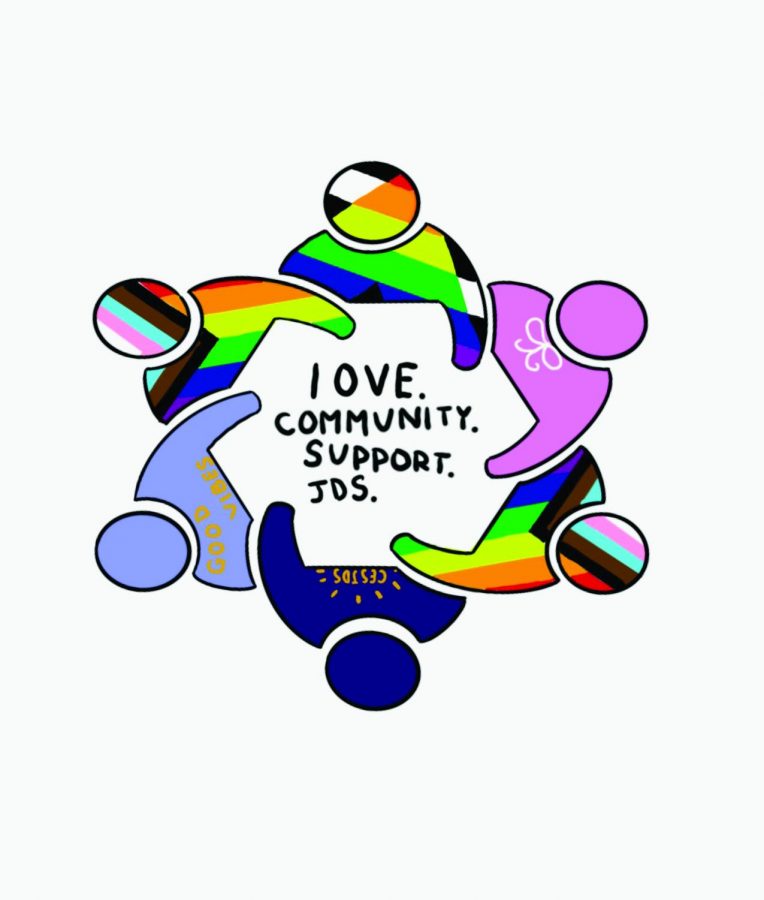Editorial: Spread love
November 9, 2021
We’ve seen the glassy stares when someone shares their pronouns. We’ve heard the insensitive jokes in the CESJDS hallways about people’s hair, clothes or sexual identities in our school. We know that unequivocally embracing the large percentage of our community that are LGBTQ+ is not something that can wait, and it’s up to us as students to ensure.
Because of societal gender norms, it is easy to make assumptions about others’ pronouns based on their appearance or voice. But it should not be queer students’ duty to quietly correct friends who misuse pronouns and to call people by the correct names; it’s on us all.
People refer to us by our names and pronouns more than we realize. Everyone deserves the basic respect of people using the correct terms for their identities.
It may feel like the correct terms or ways to respect others are constantly changing. But if you’re ever not sure about something, all you have to do is ask someone around you. On the other hand, don’t expect queer people to always answer all of your questions. It probably takes a fair amount of energy to explain their identities.
Respecting others also means respecting different clothing choices. A boy wearing a dress to school might seem unusual to the heteronormative standard, but whether it is a fashion choice or a form of gender expression, it does not warrant rude comments from others. The same goes for girls having short hair or wearing basketball shorts to school.
While it’s not good to misgender others, it’s natural that you might slip up once or twice. It’s important to learn from your mistakes and move on quickly. Making a scene or apologizing profusely only calls undue attention to the mistake.
It is also likely that you might make a mistake when it comes to someone whose name is different from the one they were given at birth. Just make a mental note and move on.
A key pillar to ensuring the wellbeing of LGBTQ+ students is simply being conscious of your actions and being kind. Sometimes, there are jokes and comments that seem to be culturally accepted that are truly insensitive or offensive, even if they are indirect. It’s much easier for us to watch our words than for queer students to deal with offensive comments.
If you hear someone in the hall describing their homework as “gay” for being irritating or difficult, call them out for it. Additionally, it is common for students to mindlessly tell someone they’re “acting gay” as if it’s an insult. It is important that we destigmatize queerness, and in that pursuit, hold ourselves and our friends accountable for skewing it as a negative attribute. Silence only perpetuates the struggles that members of our community face.
We can all try to be more inclusive in the ways we refer to others. For example, instead of referring to groups of people as “ladies and gentlemen” or “guys and girls,” we can use terms such as “friends” or “folks.” Additionally, instead of saying “he or she,” we can use the gender neutral alternative “they.”
A privilege of living in the 21st century is the amount of access we have to educating ourselves about the history and current state of the LGBTQ+ community. JDS’ GSA Club is hoping to lead an advisory class educating students about LGBTQ+ issues and guidance counselors are always willing to talk. While it is amazing to utilize these resources, education only helps us make a difference when we actually apply what we learn. It is important for us to be open to learning and accepting new information.
As a school, we pride ourselves on valuing Kehillah, community. That being said, we could be doing a lot more to make more of our members feel welcome.
Through the use of proper pronouns, being respectful to others and refraining from making any type of insensitive comment, we can grow as people and as a school. We can truly create the welcoming Kehillah that we want JDS to be, and our peers will have a better social experience for it.
Ultimately, if there are students in the JDS community who feel unsafe or unwelcome, it cannot be called a true community. We need to take the responsibility into our own hands, and work to create a culture of kindness.







